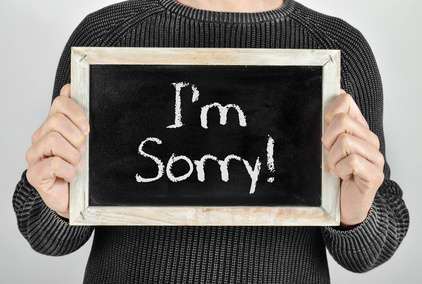My Apologies
I started a humorous (I hope) website dealing with apologies and since it’s a humor site it needs constant replenishment & resupply with humorous and/or clever content. Because there’s nothing worse than hearing the same joke(s) over and over (except for hearing them told by me, brrup-ching, thank you).
Anyway, this means that every day, I spend a few hours writing apologies, again mostly humorous apologies, but apologies. Try that and see what happens-- eventually the apologies become less humorous and more real and heartfelt, (God knows, I owe a lot of people, a lot of apologies, especially my wife) and, because of my untreated OCD, I also think a lot about apologies and this is what I think now.
Apologies are little things, practically non-existent, when you don’t need one. Really, what are they after all? One person says a bunch of words in a special order to another person. But it’s not a conversation, not barking an order, not greeting or passing the time with meaningless drivel (or twaddle if you prefer).
A real apology is a very open and vulnerable interaction. It’s only slightly less socially disadvantaging (nice verb, huh?) than telling someone “I love you.” And this is strange for two reasons; because you can, and probably should, tell people you don’t even like or know, that you’re sorry for something that happened, and the people you love should get a lot of apologies from you, and both of these are so tough that some people go years between saying they’re sorry to anyone (even themselves).
Why? Because even though apologies are tough, they’re powerful. When you give an apology, you make yourself seem vulnerable, while giving the person receiving the apology a social advantage, a chance to show who they are and how much grace they have. They could be opportunistic and refuse or rebut your apology and try to turn the moment against you and that’s actually all the advantage they have, after the 4th grade.
Giving an apology implicitly says that you and the other person are on the same level, they are worthy of your respect and consideration, that their feelings and status matters to you. I can not think of any other interaction we have with others that so simply and clearly conveys that thought. And isn’t that how most people want to be thought of. (Ending a sentence with a preposition is OK, I looked it up.)
And so, it’s more likely that the other person will accept the apology and feel better and they may think that you’re not quite the unfeeling egomaniacal psychopath they originally thought. It’s like the opposite of “collateral damage”.
But really, I think the website is funny and useful and you should check it out.
http://somebodyowesmeanapology.com
Originally published on Rising-Gorge 4/17/16



Comments
Post a Comment